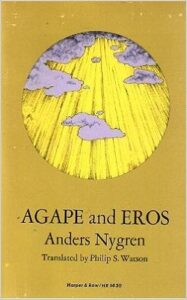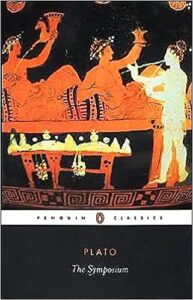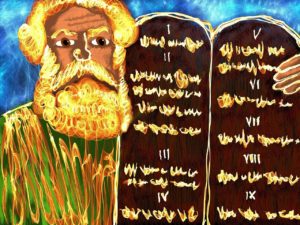As you know, Eros is the god of love and sexuality in Greek mythology and the child of Aphrodite, the goddess of beauty.
In Roman mythology, he is famous as Cupid with a bow and arrow.

In Christian theology and context, agape and eros would be defined as follows.
- Agape: the infinite and free love of God
- Eloce: love of desire to satisfy the unfulfilled self
*The Bible also uses the word “philia” to mean “fraternal love for one’s fellow man.
Therefore, in terms of “love in return or not,” it is fair to say that agape and eros are synonyms.
Thus, by definition, eroses is treated as a badass, so to speak, but can it really be done away with so easily?
In this issue, I would like to consider the direction of saving eroses and connecting it to agape in the Christian context.
The difference between agape and erose
Neo Buddhism explains that there are two kinds of love.
- Proactive love
- Dependent love
Proactive love” is literally love that considers how one can proactively give to others (family, neighbors, society, nation, and God), while “dependent love” is, conversely, love that considers how one can be given by others.
These two types of love have the exact opposite direction of energy flow.
Needless to say, in Truth Spirituality’s value system, heavenly love is the equivalent of the former ” proactive love.
In fact, this “division of love” is also discussed in Christianity.
That is the “agape” and “erose” in the title.
Both are Greek, and the Agape one is also famous for the Latin “Caritas”.
Roughly speaking, it may be possible to apply the following
- Agape: proactive love
- Elose: dependent love
This kind of classification method is actually reflected in school ethics textbooks.
One Japanese textbook seems to explain it in the following categories
- Agape: love that gives
- Elose: love that desires
This is simpler than my terms ” proactive love” and “dependent love,” and it is easier to use in practice because the direction of the energy can be understood at a glance.
However, such an agape/erose understanding, while a very common interpretation in recent years, is not so easily compartmentalized in the context of Christian history.
However, if we go into this in detail, it will be difficult to see the main point, so we will simplify the explanation this time.
In a nutshell, this agape/erose understanding is the classification method proposed by theologian A. Nygren.
A. Nygren’s classification can be further summarized as follows.
- Agape: the descending movement from reality (love from above to below), with God’s love as its essence
- Eloce: the upward movement (love from below to above) to reality, with self-love as its essence
*But regarding agape, A. Nygren does not use the word “reality”.
Then, besides agape and eros, there is also the word “philia”. This also means “love” in Greek.
Philia is sometimes translated as “fraternal love” or something similar, and has more of an “equal love” nuance.
Thus, “philia” seems to be acceptable for neighborly love, but since the love Jesus was preaching was “free love” rather than “equal love,” “agape” was daringly adopted.
Regarding agape, the Bible, for example, has the following existing statements.
“A new command I give you: Love one another. As I have loved you, so you must love one another.By this everyone will know that you are my disciples, if you love one another.” (“The Gospel of John” 13:34-35)
By the way, the Greek word for “philosophy” is “philosophia.
- Philo: love
- Sophia: wisdom
It is a combination of these two words, so it originally means “love for wisdom.
Transforming Eloce into Agape
Eloce as love for God
Whether it is my definition of “dependent love” or A. Nygren’s definition of “self-love,” erose tends to be treated one-sidedly as a “bad thing.
One reason may be that erose is generally considered to include “sexual love.
However, I would like to examine a little more deeply whether we can simply dismiss eros as a bad thing or not.
I believe that the way we perceive Eros, and the way we utilize it in practice, is related to a true theory of faith and reflection on reality (God).
Neo Buddhism recommends the Lord’s Prayer as a daily practice. Christians, of course, recite it daily.
In “The Lord’s Prayer,” there is a phrase “Give us this day our daily bread.
Have you ever felt a psychological resistance to praying to the Lord, “Give us this day,” as if you are taking something from the Lord?
There was a time when I felt that way.
At one point, however, I came to the realization that the idea of robbing the Lord is an arrogant thought that we are limiting the amount of the Lord’s energy (God’s love), which is originally unlimited.
In addition, from the perspective of “circulation of love energy,” I reaffirmed that it is a legitimate direction to utilize the love received from the Lord to love one’s neighbor.
Jesus replied: “‘Love the Lord your God with all your heart and with all your soul and with all your mind.This is the first and greatest commandment. (Matthew 22:37-38)
I think the point is how we view this law, “love for God”.
If the relationship between God (the Lord) and each of us is that of parent and child (although I see this as a phenomenal metaphor), then it is quite natural for the child to fully pamper the parent.
Rather, the parent should take pleasure in being pampered by the child. Therefore, I have come to believe that pampering (seeking) God with all one’s might is in line with “love for God.
However, pampering, such as “blaming God,” is out of the question.
Rather, we should seek God more genuinely, or, in Carl Hilty’s words, “Love for God” means to genuinely desire to always be close to God.
The following scriptures are also available.
“Come to me, all you who are weary and burdened, and I will give you rest. (Matthew 11:28)
Thinking in this way allows us to look at Eros-like “dependent love” from a different angle.
Dependence on God and begging to God are, I would say, rather prerequisites from the perspective of one’s own well-being and as a “driving force for love of neighbor”.
Therefore, the basic form of the circulation of love energy is to transform the love received from God into neighborly love.
This is, so to speak, the transformation of erose into agape.
Here, erose breaks away from being a synonym for agape; rather, one could say that “erose is completed by agape.
Eros as a longing for the world of ideas
This grasping of eros as love for God is also an argument developed in Platonic philosophy, albeit in different terms.
In books such as “Symposium” Plato speaks of the theory of “eros as a longing for the Idea,” hypothesizing on Socrates.
Even though eros may be triggered by a longing for beauty in the physical and material, the desire for beauty (eros) rises in stages and finally leads to the Idea (true existence and knowledge itself).
In short, eros is grasped as a longing for the Ideal world through the medium of beauty.
Longing for the Ideal World – This is the very definition of “love for God” when put into a Christian context.
No-self Love (anattā-Agape)
The important point is that in love for neighbor, there can also be the perspective that each of us is producing love as a new added value.
Of course, love as an added value is also originally made from energy received from God.
Eloce, as a base point, is self-love and ego-based love.
However, it is still vital to see through the positive divine mechanism in each of us reincarnating on earth and acquiring individuality.
Without denying the ego in any way, and taking care not to create a bad ego-consciousness, we use Eros as a driving force to adjust the self in the direction of self-development and to be close to God.
We use Eros as an opportunity to acquire individuality in the true sense of the word.
As you adjust your ego and develop your self in this way, paradoxically, you will gradually find yourself becoming more and more ” no-self(non-self)”.
It is the path of eternally developing self-interest and altruism so that one’s individuality and abilities can benefit God, people, and the world.
And this way of individuality is the way of the soul on the royal road.
True individuality cannot be described by ego-consciousness.
For example, I don’t think it is something as instant as “I look like me because I wear this kind of fashion.
Just as the blue of the ocean does not create its own blue, but reflects the light of the sun to show its blue, the light that naturally appears when one makes use of one’s individuality toward the sun (God) is one’s true individuality.
Here, Christian agape and Buddhist no-self are synthesized.
I would like to call it ” no-self love” (anattā-Agape).
Love thus realized is considered to take the following forms according to the Bible.
Love is patient, love is kind. It does not envy, it does not boast, it is not proud. It does not dishonor others, it is not self-seeking, it is not easily angered, it keeps no record of wrongs. Love does not delight in evil but rejoices with the truth. It always protects, always trusts, always hopes, always perseveres.(1 Corinthians 13:4-7)
This year (2020) there are more Christian articles, and I would like to compile a “theory that synthesizes Buddhism and Christianity” once some such articles have been published.
→ I authored the following articles in 2021.
*Reference article: Buddhism and Christianity – Theory to Overcome Differences and Extract Similarities
Such “synthesis” is the mission of Neo Buddhism, as well as a dialectical recursion from philosophy to theology, or “spiritual phenomenology.












Comments